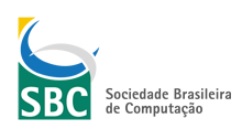Sistema Multiagentes para Indexação e Recuperação de Objetos de Aprendizagem
Resumo
Com crescimento da produção e disseminação dos recursos digitais, uma gama de repositórios surgiram para atender demandas necessárias para seu arquivamento, divulgação e acesso. Assim tem-se um cenário onde o recurso digital, existe, é armazenado e está disponível ao acesso. Porém sua recuperação está comprometida por alguns fatores, tais como, diferentes tipos de descrição, grande quantidade de recursos ou ineficiência nas técnicas de recuperação da informação. Nesse escopo propõe-se, baseado nas técnicas e adaptabilidade de sistemas multiagentes, um modelo de busca e recuperação de informação.Referências
CESTA. Collection of Entities Support the use of Technology in Learning. Center for Interdisciplinary Studies in New Technologies in Education (CINTED), 2010. Disponível em [link] Acessado em 2 Abril 2010.
D'AGOSTINE (10 de novembro de 2011), D'AGOSTINE, Caio S. Captura e Gerência de Informações de Contexto Semântico para Recuperação de Informação. 2009. 114 f. Dissertação (Mestrado em Ciências da Computação) - Programa de Pós-graduação em Ciências da Computação, Universidade Federal de Santa Catarina, Florianópolis, 2009.
Downes, S (2001) Learning Objects: Resources for distance education worldwide. [online] The International Review of Research in Open and Distance Learning, v. 2, n. 1, DSpace (2010). Available at [link] [Accessed: 10 April 2010].
Gil A.B., De La Prieta F. and Rodríguez S. (2011) Automatic Learning Object Extraction and Classification in Heterogeneous Environments. In:Highlights in Practical Applications of Agents and Multiagent Systems 9th International Conference on Practical Applications of Agents and Multiagent Systems, 2011, Volume 89/2011, 109-116.
Jena - A Semantic Web Framework for Java, 2010. Disponível em [link] Acessado em 3 out 2010.
LUME (2010). Lume - Repository of the Federal University of Rio Grande do Sul. Disponível em Available at [link] Acessado em 10 Fev 2010
Manouselis, N., Vuorikari, R., and Van Assche, F. (2007).Simulated Analysis of Collaborative Fil-tering for Learning Object Recommendation. SIRTEL Workshop, EC-TEL 2007.
McCalla, G. (2004) The Ecological Approach to the Design of E-Learning Environments: Purpose-based Capture and Use of Information about Learners. Journal of Interactive Media in Education, 2004 (7) Special Issue on the Educational Semantic Web. Volume 1, p. 18.
McGreal, R. (2004) Online Education Using Learning Objects. London: Routledge.
Nash, SS (2005) Learning Objects, Learning Object Repositories, and Learning Theory: Preliminary Best Practices for Online Courses. Interdisciplinary Journal of Knowledge and Learning Objects, New York, 2005.
Recker, M., Walker, A., and Lawless, K.(2003). What do you recommend? Implementation and ana-lyses of collaborative information filtering of web resources for education. Instructional Science, 31(4-5), pp. 299-316.
UNASUS-UFSC (2011). Repositório UNASUS-UFSC. Disponível em [link] Acessado em 19 jan 2012.
Vian J., Silveira R.A. (2011) Multiagent System for Indexing and Retrieving Learning Objects. In: Highlights in Practical Applications of Agents and Multiagent Systems Advances in Intelligent and Soft Computing, 2011, Volume 89/2011, 53-60, DOI: 10.1007/978-3-642-19917-2_7
Wooldridge, M. An Introduction to Multiagent Systems. England: John Wiley, 2002.
D'AGOSTINE (10 de novembro de 2011), D'AGOSTINE, Caio S. Captura e Gerência de Informações de Contexto Semântico para Recuperação de Informação. 2009. 114 f. Dissertação (Mestrado em Ciências da Computação) - Programa de Pós-graduação em Ciências da Computação, Universidade Federal de Santa Catarina, Florianópolis, 2009.
Downes, S (2001) Learning Objects: Resources for distance education worldwide. [online] The International Review of Research in Open and Distance Learning, v. 2, n. 1, DSpace (2010). Available at [link] [Accessed: 10 April 2010].
Gil A.B., De La Prieta F. and Rodríguez S. (2011) Automatic Learning Object Extraction and Classification in Heterogeneous Environments. In:Highlights in Practical Applications of Agents and Multiagent Systems 9th International Conference on Practical Applications of Agents and Multiagent Systems, 2011, Volume 89/2011, 109-116.
Jena - A Semantic Web Framework for Java, 2010. Disponível em [link] Acessado em 3 out 2010.
LUME (2010). Lume - Repository of the Federal University of Rio Grande do Sul. Disponível em Available at [link] Acessado em 10 Fev 2010
Manouselis, N., Vuorikari, R., and Van Assche, F. (2007).Simulated Analysis of Collaborative Fil-tering for Learning Object Recommendation. SIRTEL Workshop, EC-TEL 2007.
McCalla, G. (2004) The Ecological Approach to the Design of E-Learning Environments: Purpose-based Capture and Use of Information about Learners. Journal of Interactive Media in Education, 2004 (7) Special Issue on the Educational Semantic Web. Volume 1, p. 18.
McGreal, R. (2004) Online Education Using Learning Objects. London: Routledge.
Nash, SS (2005) Learning Objects, Learning Object Repositories, and Learning Theory: Preliminary Best Practices for Online Courses. Interdisciplinary Journal of Knowledge and Learning Objects, New York, 2005.
Recker, M., Walker, A., and Lawless, K.(2003). What do you recommend? Implementation and ana-lyses of collaborative information filtering of web resources for education. Instructional Science, 31(4-5), pp. 299-316.
UNASUS-UFSC (2011). Repositório UNASUS-UFSC. Disponível em [link] Acessado em 19 jan 2012.
Vian J., Silveira R.A. (2011) Multiagent System for Indexing and Retrieving Learning Objects. In: Highlights in Practical Applications of Agents and Multiagent Systems Advances in Intelligent and Soft Computing, 2011, Volume 89/2011, 53-60, DOI: 10.1007/978-3-642-19917-2_7
Wooldridge, M. An Introduction to Multiagent Systems. England: John Wiley, 2002.
Publicado
02/05/2012
Como Citar
CAMPOS, Ronaldo Lima Rocha; SILVEIRA, Ricardo Azambuja.
Sistema Multiagentes para Indexação e Recuperação de Objetos de Aprendizagem. In: WORKSHOP-ESCOLA DE SISTEMAS DE AGENTES, SEUS AMBIENTES E APLICAÇÕES (WESAAC), 6. , 2012, Florianópolis/SC.
Anais [...].
Porto Alegre: Sociedade Brasileira de Computação,
2012
.
p. 291-295.
ISSN 2326-5434.
DOI: https://doi.org/10.5753/wesaac.2012.33157.



